Suspected modern slavery victims in UK ‘at highest quarterly level on record’
Some 4,171 potential victims of trafficking, slavery and forced labour were referred to the Home Office between April and June.

Your support helps us to tell the story
From reproductive rights to climate change to Big Tech, The Independent is on the ground when the story is developing. Whether it's investigating the financials of Elon Musk's pro-Trump PAC or producing our latest documentary, 'The A Word', which shines a light on the American women fighting for reproductive rights, we know how important it is to parse out the facts from the messaging.
At such a critical moment in US history, we need reporters on the ground. Your donation allows us to keep sending journalists to speak to both sides of the story.
The Independent is trusted by Americans across the entire political spectrum. And unlike many other quality news outlets, we choose not to lock Americans out of our reporting and analysis with paywalls. We believe quality journalism should be available to everyone, paid for by those who can afford it.
Your support makes all the difference.The number of suspected modern slavery victims in the UK has risen to its highest quarterly level on record, figures show.
Some 4,171 potential victims of trafficking, slavery and forced labour were referred to the Home Office between April and June.
That was a rise of 10% from the previous quarter and up a third from the same period in 2021.
It is also the highest quarterly figure since records began in 2009.
April to June also saw the highest number of potential adult victims, child victims, and victims claiming their exploitation took place overseas recorded.
And 589 referrals involved county lines drugs gangs – again the highest quarterly number since records began.
We are worried to see a rise in recorded modern slavery cases, at a time when the life circumstances of so many survivors seems uncertain
Overall, 14% of referrals involved county lines, with three-quarters of these concerning boys (446).
The figures for suspected modern slavery victims have been rising each year, apart from a slight dip in 2020 at the height of the coronavirus pandemic.
Last year, 2,727 potential victims were identified – the highest annual figure since data first started being collected, when the number was 552.
Thursday’s figures show the number of potential victims of modern slavery who were identified and referred for support under the national referral mechanism (NRM).
Of the referrals, 54% were for potential victims who claimed exploitation as adults and 39% who claimed exploitation as children.
Some 43% claimed their exploitation took place overseas only, compared to 36% in the previous three months.
The majority (79%) of the suspected victims were male. The most commonly reported form of exploitation for adult victims was labour exploitation (32%), while children were most often referred for criminal exploitation (44%).
The Home Office also received reports of 1,125 adult potential victims under the Duty to Notify (DtN) process – the highest quarterly figure recorded.
Since 2015, authorities in England and Wales have had a duty to inform the Home Office of suspected adult victims who do not consent to being referred under the NRM.
Maya Esslemont, director of After Exploitation, a non-profit organisation, said this “could represent a loss of trust between survivors and the authorities, as the latter can no longer promise victims that they will be protected from deportation if they comply with an investigation”.
She said: “We are worried to see a rise in recorded modern slavery cases, at a time when the life circumstances of so many survivors seems uncertain.
“Since the Nationality and Borders Act was brought into force, survivors no longer have a ‘guarantee’ of support even if they are recognised by the Home Office’s own decision makers as victims.
“Today’s figures show just how urgently this government needs to step up and address the long-term challenges facing each of the victims recognised as an NRM statistic.”